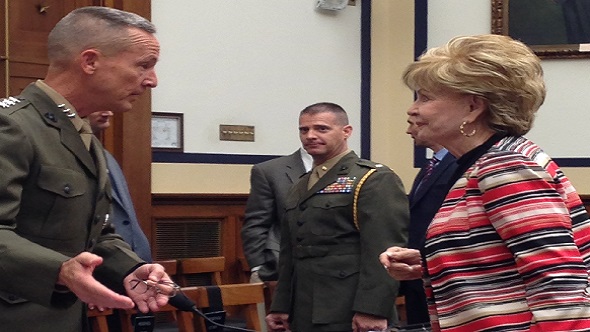 Lt. Gen. Mason talks to Congresswoman Madeleine Bordallo, D-Guam.
Lt. Gen. Mason talks to Congresswoman Madeleine Bordallo, D-Guam.
WASHINGTON — Top military officials told a House military readiness subcommittee Wednesday that government shutdown-induced furloughs of civilian defense workers send “a pretty poor signal” to employees still reeling from the effects of the sequestration cuts.
“Words such as ‘disrespectful’ come to mind,” said Marine Corps Lt. Gen. William M. Faulkner, deputy commandant for installation and logistics. Lt. Gen. Raymond Mason, deputy chief of staff of the Army, talked of the pain of looking into the eyes of his civilian employees as he told them, many of whom were still recovering financially from earlier cost-cutting furloughs, that they were furloughed under the shutdown.
“Compounding of the furlough from last year and now this year is an issue,” he said, adding that because of the closing of the commissaries, many military families would lose about 30 percent of their savings.
Faulkner said he was worried about losing good recruits. “We’re going to have a lot of people who are going to walk because there are a lot of other opportunities out there if they’re disrespected like this.”
The committee wanted to hear from Faulkner and Mason about the risks to military readiness posed by the across-the-board federal budget cuts required under sequestration.
Mason said funding cuts directly hurt three areas: readiness, modernization and the workforce.
The first place the Pentagon goes to cut Army spending is bases “because that’s the money that’s readily available,” he said.
By cutting back on new equipment and technology, “we’re risking the future, we’re risking it now,” Mason said.
He said restrictions on hiring and overtime combined with previous furloughs for civilian employees “continue to negatively affect productivity.”
